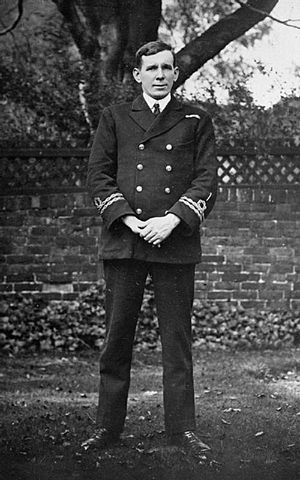Charles George Bonner facts for kids
Quick facts for kids
Charles George Bonner
|
|
|---|---|

Lieutenant Charles Bonner c.1917
|
|
| Born | 29 December 1884 Shuttington, Warwickshire |
| Died | 7 February 1951 (aged 66) Edinburgh, Scotland |
| Allegiance | |
| Service/ |
|
| Rank | Captain |
| Unit | HMS Dunraven |
| Battles/wars | First World War |
| Awards | Victoria Cross Distinguished Service Cross |
| Other work | Marine salvage expert |
Charles George Bonner (29 December 1884 – 7 February 1951) was an English hero. He received the Victoria Cross, which is the highest award for bravery given to British and Commonwealth soldiers. This award is for showing amazing courage when facing the enemy.
He later became a captain in the Merchant Navy, which is the part of the navy that handles trade ships.
Charles Bonner's Bravery in World War I
On 8 August 1917, during the First World War, Lieutenant Bonner was serving in the Royal Naval Reserve. He was on a ship called HMS Dunraven. This ship was a special "Q-ship," which meant it was disguised as a normal merchant ship.
While in the Bay of Biscay in the Atlantic Ocean, the HMS Dunraven was attacked by an enemy submarine. Lieutenant Bonner was right in the middle of the fighting. His courage and strong will greatly helped his crew during the entire battle.
Because of his brave actions, Charles Bonner was awarded the Victoria Cross. Another brave sailor, Ernest Herbert Pitcher, also received the Victoria Cross for his part in the same event.
Remembering a Hero
Charles Bonner passed away at his home in Edinburgh in 1951. He was 66 years old. His ashes were buried in St Mary's Churchyard in Aldridge, which was his birthplace.
In November 2007, a special plaque was put up in Aldridge to remember Captain Bonner. His life and bravery are celebrated there every year during the Remembrance Day parade.
In December 2009, another memorial plaque was unveiled at the Town Hall in Walsall, England. This plaque honors Bonner and two other Victoria Cross recipients, James Thompson and John Henry Carless.
 | Stephanie Wilson |
 | Charles Bolden |
 | Ronald McNair |
 | Frederick D. Gregory |

